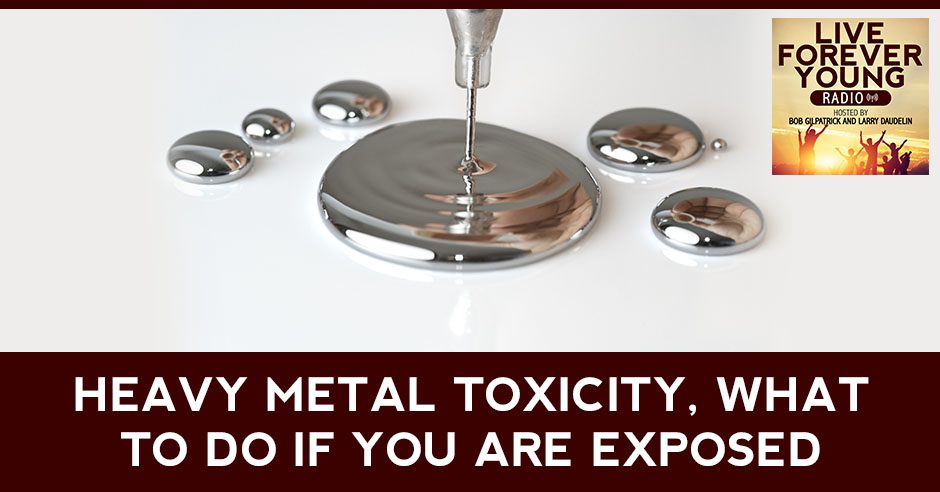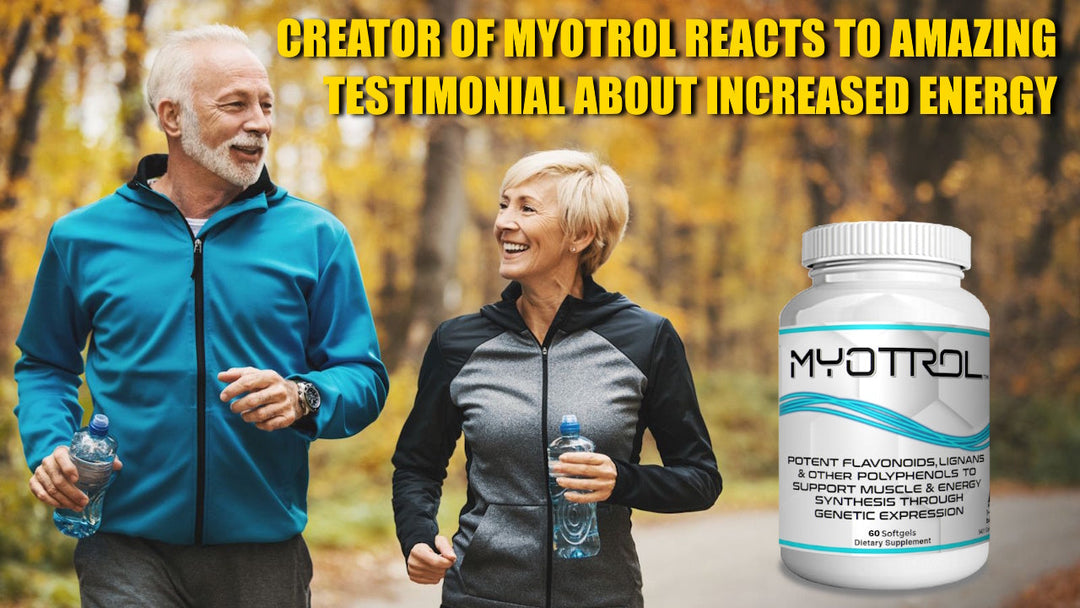Heavy Metal Toxicity, What To Do If You Are Exposed
 Heavy metal toxicity can be a life-threatening issue that many of us have to deal with. For example, did you know that heavy metals can be found in air, water, foods and even some medicines?
Heavy metal toxicity can be a life-threatening issue that many of us have to deal with. For example, did you know that heavy metals can be found in air, water, foods and even some medicines?
Bob Gilpatrick and Rollie Culp talk about heavy metal toxicity and the effects it can have on your health. They identify the most common metals associated with heavy metal poisoning and how you can avoid being exposed. Bob and Rollie also cover what you can do to help detoxify your body of heavy metals if you have been or are at risk of being exposed. Tune in to learn more about heavy metal toxicity and why it matters to your health.
Watch the podcast here:
Listen to the podcast here:
Heavy Metal Toxicity, What To Do If You Are Exposed
Detoxify Your Body
Did you know that heavy metals can be found in air, water, foods and even medicines? On this show, Bob and Rollie talk about heavy metal toxicity and the effects it can have on your health. They identify the most common metals associated with heavy metal poisoning, and how to avoid being exposed. Bob and Rollie also cover what you can do to help detoxify your body of heavy metals if you have been or are at high risk of being exposed. Sit back, relax and get ready to live forever young.---
Welcome to the show. I'm here with Rollie. How's it going, Bob? The one thing that I have to say is when you talk about becoming healthy and doing the best that you can, some of the things, you can account for. You can get exposed to lots of things. What we're talking about is heavy metal exposure or heavy metal toxicity. Many people don't realize it but that is very common nowadays, especially with all the things that we have heavy metals in.
There are heavy metals in the soil, in the air and in the water, which we had heard about going back to the 2015 timeframe when they had that big scandal in Flint, Michigan. I'm from Michigan. When I heard about that, I was extremely disappointed.
What had happened was in order to try to save some money, the government officials decided to change the water supply from Lake Huron, one of the great lakes, to the Flint River. That doesn't sound like a good switch to me.

Heavy Metal Toxicity: There are heavy metals in the soil, air, and water.
They’ve created a big problem. What they were saying is that they knew that the Flint River was a little bit more corrosive of a water supply, but they still switched it over. It dropped the fertility rates in the area by 12%. It increased the infant death rate by 58%. Many infants also that were born that lived ended up with birth defects.
A big reason why this happened is that they didn't treat the water. They hooked the water supply up but they never treated the water coming in from the river. They figured this out and a couple of things happened to the officials. They got a couple of counts of misdemeanors and felonies, but 34 felonies on a couple of the officials there in Flint, Michigan.
Most of the charges were dropped as what happens a lot of times in cases like this when you have a civil suit. This one resulted in $641 million in damages. That sounds a lot but still, you think about health is priceless and they took that away. At least they're working on fixing it. They said they switched it back.
They switched it back to Lake Huron. Other things you have to watch out for that are environmental like that and one that we've heard about for a long time is lead poisoning. In 1978, they stopped using lead in paint that they were painting houses with. If you live in a house built prior to 1978, you still could have trouble with lead paint. It's not just if someone was to eat a paint chip. That lead paint can also have a problem with the lead being in the air and inhaled.
You used to hear a long time, "Would you eat too many paint chips as a kid?" You don't even have to eat them. Just being exposed to the air and the environment, especially in an enclosed house when it's off-gassing these things after years of being on the wall is not good.
Another one that people hear about is mercury poisoning. Going back many years ago, mercury was a very common industrial chemical. People would get sick and die from working around mercury. You also have mercury in environmental pesticides and older fluorescent lights.
When you break the long tubes and you see that gas coming out, don't hang around that gas. You can inhale mercury. Mercury poisoning can be very devastating. They used to use that in thermometers. I remember my dad telling me when a thermometer would break, because of the way it globs back together, they would sit there and play with the mercury with their fingers. Don't do that.
Arsenic is another one that's in food and water. People can get arsenic poisoning. Don't they put that in cigarettes too? I've heard they’ve put that in cigarettes. The answer is yes. According to a report from the California Air Resources Board and the Department of Health Services, smokers breathe in approximately 0.8 to 2.4 micrograms of inorganic arsenic per pack of twenty cigarettes. About 40% of it is deposited in their respiratory tract.

Heavy Metal Toxicity: If someone gets acute heavy metal poisoning, if you've been exposed, get to the emergency room right away. You may have to, in some cases, have your stomach pumped out if it's from ingestion or support for your lungs if you've inhaled it.
Another one that's in the soil and also in batteries is cadmium. That can be particularly devastating. You also have too much chromium in the soil, chemicals in metal industries or something like that. A lot of the poisoning comes from industry. Processes of making things in the industry utilize and have the situation where the heavy metals can get into the water supply and into the soil.
The waste from their production ends up having to be put somewhere. They used to say, "Dilution is the solution to pollution," but we know that's not true anymore.
You also have cookware that can cause problems. Even something like aluminum can accumulate, especially in your brain. Research shows an association between Alzheimer's disease and aluminum accumulation.
Other things that you see as symptoms are things like headaches and also people that are always drowsy, even more serious things like kidney malfunction and problems with your nervous system, even disorders in your brain in addition to Alzheimer's. With mercury poisoning, people would sometimes get seizures and gastrointestinal distress.
I was reading a little bit before we did the show. Back in the day, I wear a lot of hats. In the felt hat industry, the hat makers would go crazy. They would suffer from what they call mad hatter syndrome. What they would do is the lining around the edge, they would use mercury in that process. The touching and the constant inhaling of those vapors as they heat it would cause them to go crazy. It causes over-excitability.
I'm sure you've seen Alice In Wonderland. They act all crazy and off the wall. That's what physically happened to people back in the day when they were hatters. They would turn mad. It's not just a character in a fairy tale. It's based on reality, which is crazy.
You can see this can be a serious issue. You need to know that if someone gets acute heavy metal poisoning and you know that you've been exposed, you want to get to the emergency room right away. In some cases, you may have your stomach pumped out if it's from ingestion or support for your lungs if you've inhaled it. If you have chronic long-term exposure, you can get tested for this.
You can have a blood test, a urinalysis, a hair analysis. You can get a list of many heavy metals, 20 or 30 of them that you can get tested for. If you do have such a thing, there's a treatment called chelation therapy. Chelation means claw.
They've called it chelation because if you have heavy metal, this chelating agent comes and it will wrap itself around it like a claw. It disguises it as something else that needs to be moved out of your body, and then it comes out through your urine.
Chelation is done at a chelation center where they're trained to do it. Before you go, you have to consume enough protein and water. You go and they inject these chelating agents right into your bloodstream. You can go for one treatment to knock it down a little bit. Sometimes people will go for 20 or 30 treatments before they can get most of those heavy metals out of their bodies. There's a chelation center right across the street from us in one of the medical offices.
The other thing is there's a product which we have called zeolite. It is a honeycomb type of compound that attracts heavy metals to it. The heavy metals will come in and get trapped inside these honeycomb types of structures, and then the whole honeycomb will get passed out of your body in your urine. Is it similar to the chelation thing?
Yeah. Zeolite is taken in liquid form usually. You would start by taking one drop on your tongue, and just swallow it. You would do that for a few days. You would do one drop. After a few days, you could increase to two drops and keep ongoing. Some people notice a very dark color in their urine as heavy metals come out.
If you're getting rid of stuff through sweat and things like that, you might have some of it exposed to your skin coming out that way. Some of the things we talk about here are things most people aren't aware of. I don't think we mentioned that heavy metals are essential to the body and health but in really small amounts.
When you come into contact with a large amount of heavy metals, it can throw that balance off. That's where a lot of the things come like what we were talking about the GI issues and the kidney malfunction. Depending on what you're exposed to, a lot of it can affect you differently like what we were talking about mercury affects the mind and other things. They could affect your intestinal system.
They could affect your nervous system as well. You’ll have an issue depending on what kind of metal you get exposed to. If you work around heavy metals for your job, it's important to try to prevent exposure. Wear masks, cover up, wear gloves and protective clothing. That way, you can at least mitigate it a little bit.
I've talked to a couple of people I know who are in the automotive industry. They're mechanics and they paint a lot of stuff. When you paint a car, you're still using paints with a lot of lead and things like that in them. They wear huge respirators. If you see what they paint in, it's always well-ventilated. You can't be exposed to these things because that accumulation will cause a problem.

Heavy Metal Toxicity: If you work around heavy metals for your job, it's important to try to prevent exposure. Wear masks, gloves, and protective clothing. That way, you can at least mitigate it a little bit.
Your body is very gelatinous and absorbs things very easily through your skin and lungs, and what you are drinking and eating. If they tend to accumulate, they're going to interfere with your cellular function. That's one of the reasons why lethargy is a common symptom.
It's interfering with the production of adenosine triphosphate in your Krebs cycle. People will have very low energy as a result. Not only that, but the energy that is being produced normally fuels all your other metabolic pathways. That's why when you have poisoning, so many different parts of your body can be affected.
Another source of some of these heavy metals, believe it or not, can be medicines. There is this thing called thiomersal. It's something that they use in multi-dose vaccines. It's something you got to be careful about because if you expose yourself, or you're not aware of what it is that you're exposed to in your environment, you start getting symptoms of drowsiness and confusion. Some people even get seizures. Be on the lookout for these. They're things you wouldn't realize.
If people want to get some zeolite, what I would recommend first is to get your test for heavy metal toxicity and see what your level is. If you like to use some zeolite, we can help you with that.
We have some good stuff available. Ours is a little different in the sense that you can take it longer than normal zeolite. It won't deplete your potassium. Some people, when they use zeolite that's not like ours, they're concerned about the depletion of potassium. You don't want to do that. Ours is formulated in a way that it doesn't affect that. You could take it for longer amounts of time, help remove the metals, and get the things flushed out of you, so you're not toxic.
People can call us at the office if you want to talk about it. Go to BoomerBoost.com. Not only is heavy metal toxicity an issue, but we talk about a lot of different things on our show. One of the things we talk about all the time is inflammation. This exposure to these toxic things is causing inflammation. Another good thing to do is work on ways to keep inflammation down in general, especially if you're experiencing heavy metal toxicity.
Those are some things you want to do as well. Take good antioxidants. Make sure you're drinking lots of water to flush your system out. Try to find a chelating agent that can help you and hopefully feel better. Rollie, thank you very much for being here. Thank you, everybody, for reading. We'll see you at the next show.






Leave a comment